General Washington’s Christmas Farewell HC A Mount Vernon Homecoming 1783 Stanley Weintraub
$69.99
Description
General Washington’s Christmas Farewell: A Mount Vernon Homecoming, 1783 Hardcover
by Stanley Weintraub (Author)
One of America’s greatest Christmas stories and also one of its very first — from the period between the end of the Revolutionary War and the ratification of the Constitution — was a creation of none other than George Washington. The story isn’t just about Washington coming home for Christmas for the first time since the war began, but about the character of our most important Founding Father and about the precedent he set for democratic leadership. It is the story of a loving husband, a beloved military leader, and above all, a humble and great man.
In late November 1783 when Washington finally received formal notice of the signing of a peace treaty with England he had little more than a month to accept the transfer of power from British troops in New York; to bid farewell to his troops; and to resign his commission to Congress if he hoped to make it to Mount Vernon for Christmas. He could have remained in charge of the army and become a virtual king to the Americans who loved him. Control of the newly forming government was his to take — yet he chose to resign. It was that decision, coupled with his later decision to step down from the presidency after two terms, that rendered him “the greatest character of the age” (according to none other than King George III).
Washington’s homeward journey is one of the most moving and inspiring stories from his great and eventful life. When he bade farewell to his troops at Fraunces Tavern in New York City there were no dry eyes. When he reached Congress and gave a retirement speech, it cemented his greatness more fully than had his victory over the British. When he made it to Mount Vernon, finally, on Christmas Eve, it could not have been a happier homecoming.
General Washington’s Christmas Farewell is a deeply moving Christmas story as well as a great American story.
Hardcover: 224 pages
Publisher: Free Press
Lord Byron once called George Washington the “Cincinnatus of the West,” and Weintraub’s compelling account also compares the modern general to the ancient military leader who longed to return to his plow. Washington, weary after eight years of leadership on the battlefield, yearned to return to the life of a farmer at his beloved Mount Vernon, 1,800 acres of land alongside the Potomac River on which his plantation stood, but since he had accepted his commission in 1775, he had returned there only once. By the fall of 1783, after orchestrating the reoccupation of New York-his final act in a distinguished military career-Washington began his long journey back to his wife and home, anxious to arrive in time for Christmas. Drawing on Washington’s letters and private papers, Weintraub, who had so much success with another Christmas break in Silent Night: The Story of the World War I Christmas Truce, recreates the general’s four-week journey home. Along the way, Washington bid farewell to numerous colleagues, was feted in grand style in Philadelphia and Annapolis, and oversaw the transfer of power from the British monarchy to a former colony’s republican government. In spite of weather-related delays, Washington arrived at his plantation on Christmas Eve. The general and his wife celebrated the holiday together with numerous guests by burning a Yule log, firing guns and eating heartily. Weintraub’s graceful narration brings to life a distant time and place in America, capturing intimately Washington’s loyal patriotism and his deep commitment to family.
Don’t be put-off by the cheesy title of this book. Yes…it’s obviously a marketing ploy meant to tie in to the holiday season. In any case, Mr. Weintraub has crafted an interesting book. We follow Washington from West Point to Mount Vernon, as he tries to get home for Christmas. Most notably, he stops in New York City, Philadelphia, and Annapolis. In NYC he says farewell to his officers. He also puzzles his subordinates by going to visit a bookseller who is a known Tory sympathizer. (Unknown to Washington’s underlings, the man was part of the commander-in-chief’s network of spies who kept Washington informed of the goings-on in British occupied NYC.) In Philadelphia, amongst other things, Washington orders some new spectacles from the noted scientist David Rittenhouse. In Annapolis, Washington returns his commission to Congress, thus making formal his resignation from public service and return to private life. The book is only about 175 pages and can easily be read in a day or two. However, Mr. Weintraub manages to provide a lot of information. Some of it is interesting on a “serious” level – for example, we see Washington at the start of the journey insisting that his departure from public life will be permanent. He made several speeches on the way home, and he constantly stressed that Congress needed strong legislative powers so that it could hold the bickering colonies together. By the time he reached Annapolis, Washington had come to the conclusion that it was going to be an extremely difficult process to turn a loose confederation, which no longer had the “glue” of battling a common enemy , into a true nation. Washington was not being an egomaniac, just realistic, when he came to understand that he was the only person who could be a unifying force. Therefore, when he gave the speech in Annapolis in which he resigned his commission as commander-in-chief he changed the language so as to leave the door open for a later return to public service, if such a thing proved to be necessary…which it did. Washington was remarkably unambitious for someone who was held in such awe. He was, indeed, the man who could have been king. (In his own day, everyone wanted to touch him, as though he were holy. Many years later, people had relics – as though he were a saint. Lincoln had a splinter of Washington’s coffin contained in a gold ring he wore. McKinley had several strands of Washington’s hair.) We owe Washington an eternal debt that he turned his back on dictatorship. On the lighter side, we see Washington the man, warts and all. We see him losing his temper, we see his pride in his dancing ability, his love of fine wine, etc. We also get to hear about his expense account, where it seems as though he put down every possible item, down to the last pound, shilling, and pence. (He even included tips he had given out to people who had waited on him.)
I especially enjoyed the little personal touches that Mr. Weintraub included – such as letting us know that the 6’4″ Washington slept in a 6’6″ bed. The author also tells us about the time that Washington fired a Mount Vernon gardener for getting drunk. Then, when the man expressed remorse and wanted his job back, Washington agreed….but he made the man sign a contract specifying that he could only get looped at certain times of the year. For example, he was allowed 4 days of drunkenness around Christmas! The book, on rare occasions, becomes tedious when Mr. Weintraub gives us excerpts from speeches delivered during the various “farewell” dinners. But, for the most part, this book will hold your interest with its nice balance between the public and the private Washington.
Free Press, 2003. 1st printing. Some dust on dust jacket on back cover. 0-7432-4654-3.
0-7641-0446-2
A bit of writing, underlining, highlighting. Sticker residue on back cover.
Related products
-
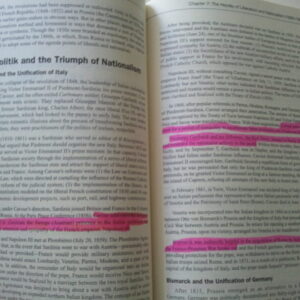

AP European History Testware Edition 10th Edition SC REA
$49.99 Add to cart -
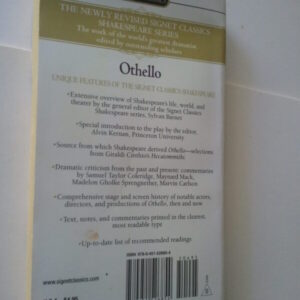
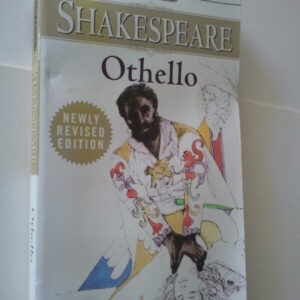
Othello Newly Revised Edition SC Shakespeare Signet Classics Alvin Kernan Critical Essays
$19.99 Add to cart -
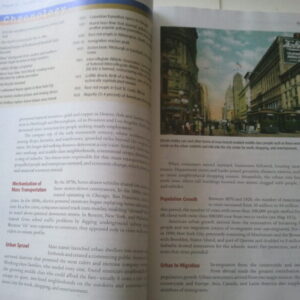
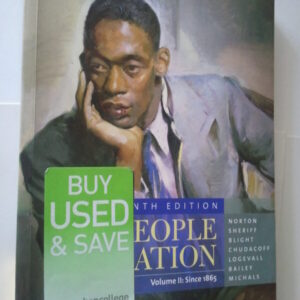
A People & A Nation Vol 2: Since 1865 Brief 9th Edition SC Norton Sheriff Blight Chudacoff
$69.99 Add to cart -
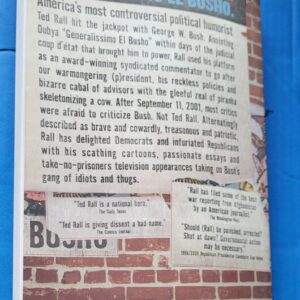
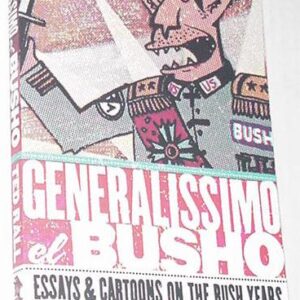
Generalissimo el Busho Essays & Cartoons on the Bush Years SC Ted Rall NBM Publishing
$39.99 Add to cart




